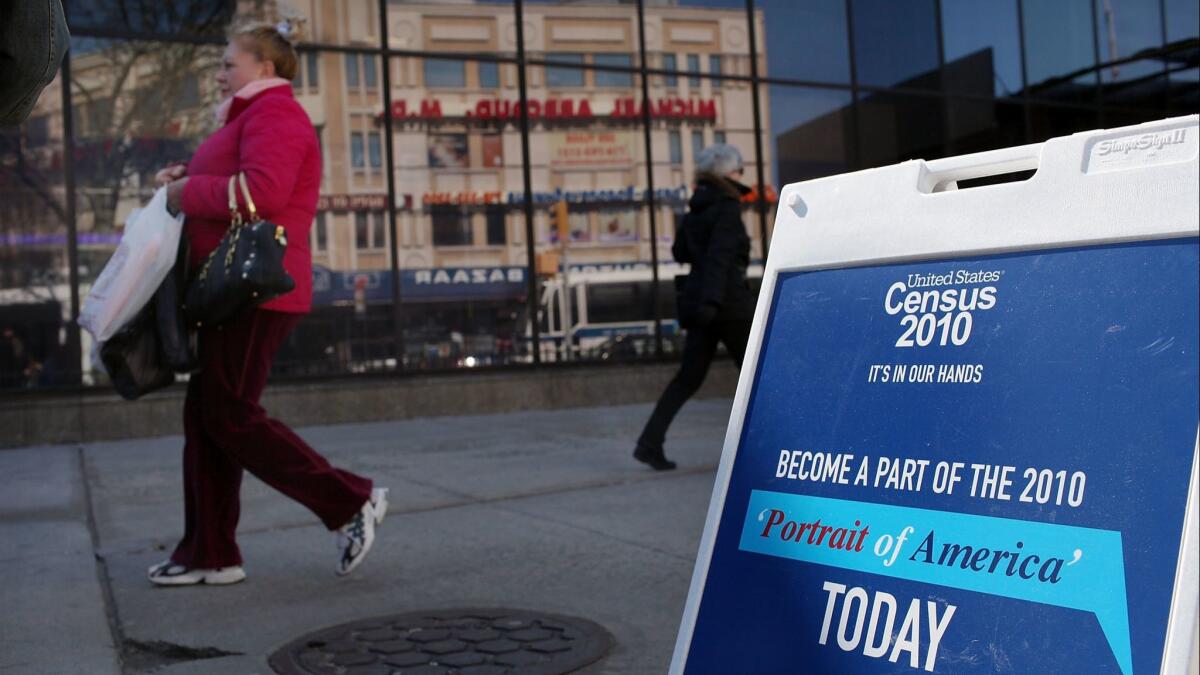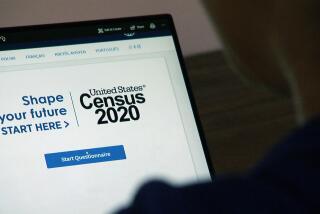The 2020 census could undercount 1 million kids — which means less money for California schools

- Share via
Almost a quarter of the nation’s children under 5 are at risk of not being counted in the 2020 census, which could have serious implications for the well-being of children around the United States, according to a recent study by the Annie E. Casey Foundation.
The problem has grown worse over the last four decades, experts said. In 2010, the census failed to count nearly 1 million children younger than 5. Experts warn that it could exceed that number in 2020.
“Undercounting young children has gotten worse every census since 1980. Without intervention, it’s going to get worse in the 2020 census,” said Laura Speer, associate director for policy reform and advocacy at the Casey Foundation and coauthor of the report.
Below is a deeper look into the reasons young children have been undercounted and what’s at stake in the 2020 census.
Which children are most at risk of being undercounted?
Children of color and low-income kids are most at risk, as well as immigrant children, according to the study.
There are nearly 17 million people in the U.S. who live in households with at least one person who is in the country illegally, the study stated, and the decision to include a citizenship question on the 2020 census survey might heighten fears of immigrants who lack legal status and may deter those families from filling out the questionnaire.
“The issue of the citizenship question is that we don’t really know what the impact is going to be,” Speer said. “It might keep families from feeling safe from filling out the form.”
Children living with parents who frequently move or are homeless are also less likely to be counted, experts said, because it is more difficult for those households to respond to the survey.
Why are young children undercounted in the U.S. census?
There are many reasons that account for this trend.
A 2014 U.S. Census Bureau report on the issue found that guardians who care for young children who aren’t immediately their own — grandparents or distant relatives, for example — were unsure how to respond to the census questions.
The language barrier was another reason, analysts with the U.S. Census Bureau said. For recent immigrants or families living in neighborhoods where English wasn’t the primary language, the report found that people were more likely to be confused as to whether to include the child or not.
Ron Jarmin, interim director of the Census Bureau, said recently that the agency came up with a few solutions to mitigate the problem.
The wording on the census questionnaire has been changed to help clear up confusion for caregivers who are looking after young children who aren’t immediately their own.
The agency is also planning to build an online campaign aimed at educating households with young children on the importance of counting them in the survey.
Why do experts worry more children will be undercounted in the 2020 census?
The U.S. Census Bureau has suffered budget cuts in recent years, preventing the agency from being able to carry out field tests in hard-to-reach communities, Speer said.
According to the study, the U.S. Census Bureau “canceled field tests scheduled for Puerto Rico and on American Indian reservations in 2017” and also stopped a test run that “simulates the entire census process” in rural areas with spotty internet access.
Compounding this fact is that the 2020 census will largely be done online. For low-income households or people who don’t have regular access to internet, responding to the survey might be made more difficult.
In a blog post written July 2, Jarmin acknowledged that in 2010 young children were undercounted and that they remain vulnerable to being undercounted in 2020.
“The Census Bureau has been diligently working for years to ensure that an undercount of this magnitude does not occur again in 2020,” Jarmin wrote.
“Getting an accurate count of young children enables more accurate projections for many critical support service needs, such as education and healthcare.”
What’s at stake if children are undercounted?
Undercounting children has real-life implications for kids nationwide. Around 300 federal programs rely on U.S. census data for funding. According to the study, census data are used to allocate more than $800 billion a year to federal programs. If young children are being undercounted, that means less money will be allocated to federally funded programs such as Medicaid and Head Start.
That could have long-term effects, said Patrick McCarthy, president and chief executive of the Casey Foundation.
“If we don’t count children, we render their needs invisible and their futures uncertain,” he said in a recent statement.
“A major census undercount will result in overcrowded classrooms, shuttered Head Start programs, understaffed hospital emergency rooms and more kids without health care.”
An unfortunate side effect is that the kids who are more likely to be undercounted — those from low-income families, immigrants or children of color — are the ones who stand to lose the most, Speer said.
“A lot of the programs where funding goes are programs that vulnerable young children use,” she said.
Can anything be done before 2020?
A lot is at stake, and time is running out. But experts remain optimistic.
“On the plus side, the bureau is aware of the issue,” Speer said. “But early funding issues and the addition of the citizenship question are major threats to decreasing the undercount of young children.”
That’s why Speer and other experts recommended that legislators fully fund the Census Bureau so that it can improve its outreach efforts, and also said state and community groups should invest time in educating people about the importance of counting young children in the upcoming census.
“It’s not too late to ensure we conduct a census that leads to proper funding, representation and programs for the continued healthy development of kids,” McCarthy said. “But it’s up to policymakers, communities and the nation to make sure that every kid is counted and matters.”
Twitter: @melissaetehad
More to Read
Sign up for Essential California
The most important California stories and recommendations in your inbox every morning.
You may occasionally receive promotional content from the Los Angeles Times.














